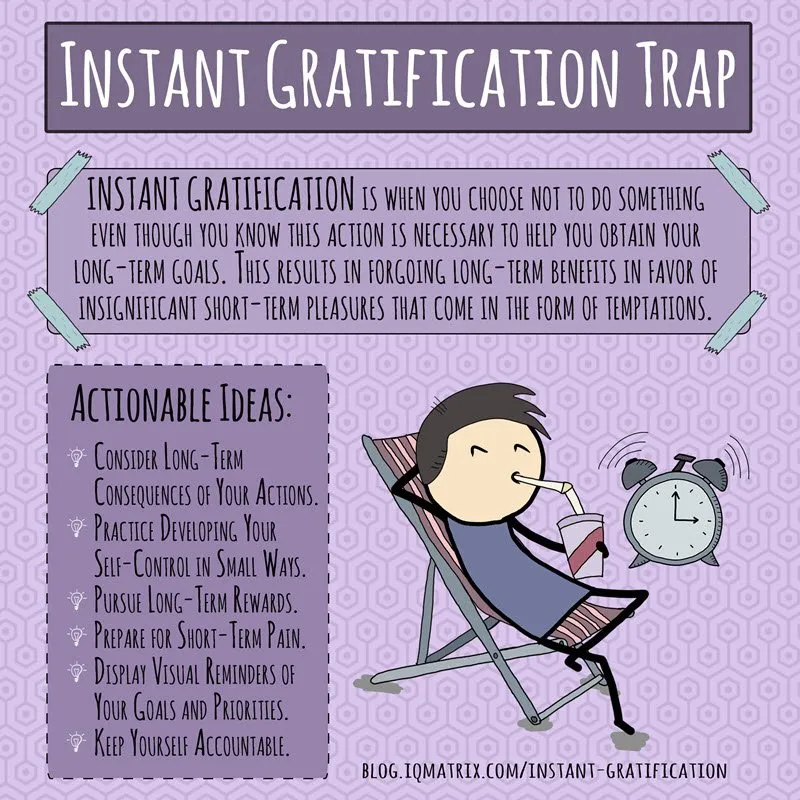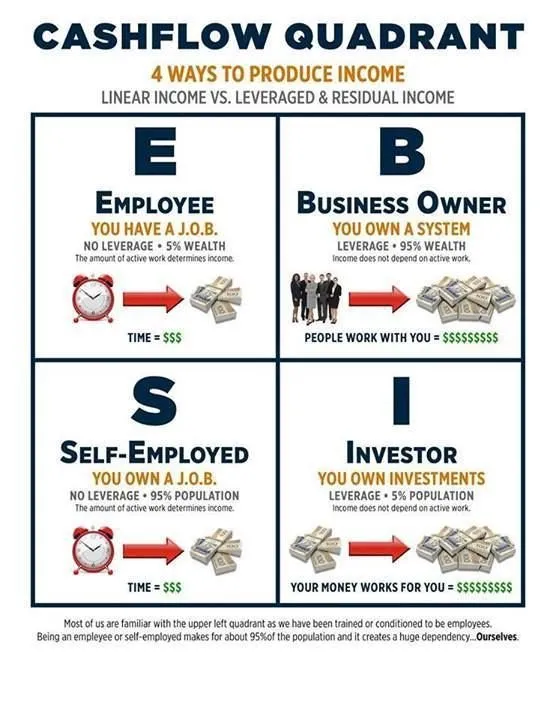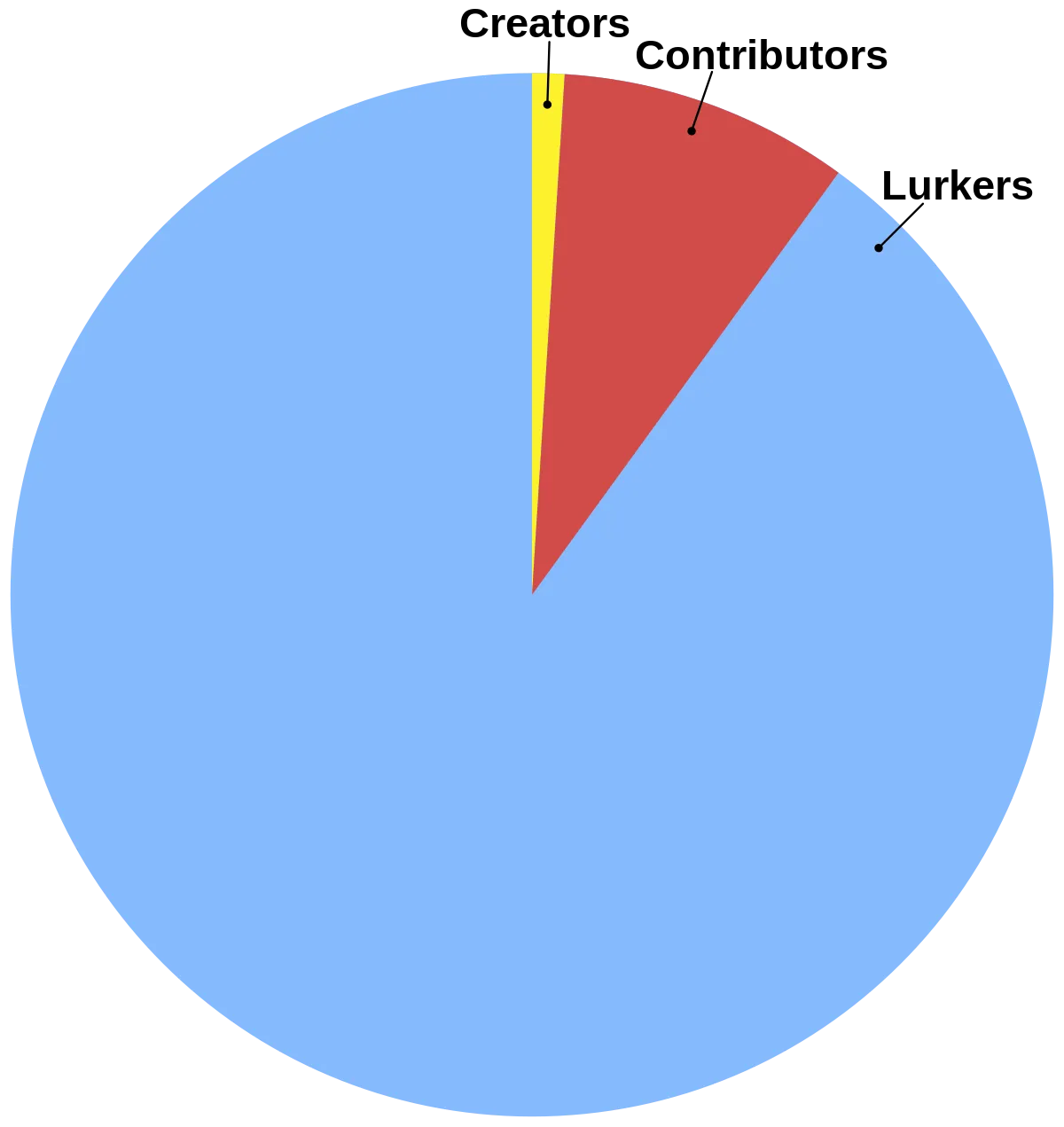In today's culture of instant gratification, it is more important than ever to have long-term goals and a plan to help you achieve the life you want to have.
The pursuit of instant gratification is so prevalent in our world today it seems a whole generation considers it the norm and the mere thought of delaying gratification for a long term vision or goal is a drag.

What Is Instant Gratification?
Instant gratification is a habit where you forgo short-term pain that will eventually lead to long-term pleasure and instead indulge in short-term pleasure that might eventually lead to long-term pain. In other words, you find reasons (excuses) not to do something because of the pain it creates in the moment even though you know that this action is necessary to help you attain your long-term goals and objectives. credit
It's natural to want to avoid pain and the illusion of having everything we could ever want available 24/7 anytime we need it gives us a false sense of abundance and availability that makes it hard for many to focus on a goal that reaches beyond the present moment.
There is a pill for every ill, an app for every occasion, and instant remedy for every problem we could possibly imagine, or so it seems, and that leads people to a belief that they don't have to put much effort into an endeavor before seeing results.
Learning to delay one's gratification is a skill set that pays dividends for years to come and it can be learned.
In Daniel Goleman's book Emotional Intelligence - Why It Can Matter More Than IQ, there is a story of a study done over many years with hundreds of participants.
In the study involving a group of 4-year old children they placed a marshmallow on a plate in front of each child and left the room, but before they left they told each child they could eat the marshmallow now or wait until the adult returned before eating it and they would get two marshmallows.
Then they recorded the choice of each child. Over the years of each one of the participants lives, they observed a noticeable trend.
Those that opted to wait (delay their gratification) were much more likely to have a higher income, better relationships, and more meaningful lives.
The children that resisted the temptation were better able to cope with stress, more socially adept, and felt more personally empowered.
According to the researcher in charge, Walter Mischel; the study shows that “Goal-directed, self-imposed delay of gratification is the essence of emotional self-regulation.” credit

Steemit Is Not About Instant Gratification
I see this played out all the time when listening to minnows struggle with getting a foothold on Steemit. They seem to equate the amount of work they do with the amount of rewards they "should" be entitled to.
The real world does not work that way.
In their famous book Rich Dad Poor Dad, by authors Robert Kiyosaki and Sharon Lechter, they talk about the differences between rich and poor people as mainly a difference in the way they think.
95% of the population thinks in ways that trade their time for money so when a new Steemit user thinks that way and they get very little rewards for all the time they spend making their initial posts they feel it is not worth their time.

This often leads them to give up before they can gain any momentum or a significant following. Coupled with a feeling of entitlement that comes from our "instant gratification" culture this mentality is a death toll to succeeding on this platform.
Many begin to complain which only serves to alienate them from the community and they eventually commit Steemicide and give up.
Why Successful Steemians Keep Saying Forget About The Money
How the world really works is money, or rewards, follow value. Valuable content and the attention of the community is the real currency of Steemit but only if it attracts attention.
People are busy and their attention is limited so it takes many moments of consistently putting valuable content in front of many eyeballs before rewards catch up to the value delivered.
That means to succeed on Steemit you have to be consistent and keep writing good posts and never give up. The honest truth is not everyone is going to do that or is even cut out to do so.
The cold hard fact is that 1% of the population are creators and the other 99% are consumers. That is the result of our consumer culture and why the people that create are the ones that make so much money.
The 1% rule has been studied and documented and states:
In Internet culture, the 1% rule is a rule of thumb pertaining to participation in an internet community, stating that only 1% of the users of a website actively create new content, while the other 99% of the participants only lurk. Variants include the 1-9-90 rule (sometimes 90–9–1 principle or the 89:10:1 ratio),[1] which states that in a collaborative website such as a wiki, 90% of the participants of a community only view content, 9% of the participants edit content, and 1% of the participants actively create new content. credit

Now you know why media outlets make a lot of money because they actively create content that the rest of us pay to consume.
To really succeed on Steemit, especially if you are starting from scratch with no investment in Steem Power, you need to develop your content creation skills, have the ability to delay your gratification, and think like a business owner.
But not like your typical business owner that trades good for services. This is a gift economy where the goods, or value, is given away for free with no expectation to be compensated. That's difficult for someone to wrap their head around if they have a mindset that their time is worth X-number of dollars.
Your time is worth something and the value you're creating has a subjective value to the community but the rewards are not paid in a linear fashion and have a delay to them.
That is why every successful Steemian keeps saying forget about the money and just keep creating valuable content and engaging with the community and being consistent.
You can't gauge the current rewards you are receiving to the amount of effort you are putting into your posts. They do not correlate linearly and if you keep thinking like that you will get discouraged and quit.
This brings us back to my original point, that of delayed gratification. Every successful Steemit user has made nothing on a post when they first started unless they invested and put their hard earned money at risk.
Delayed gratification is a habit where you forgo short-term pleasure (present comfort) in order to gain significant long-term pleasure and rewards in the future.
In other words, you ward off short-term temptations that might distract you from your long-term goals and objectives in order to focus on what you need to do to achieve your desired long-term outcomes. This, of course, might require that you suffer through short-term pain, fully realizing that this pain is only temporary but necessary to help you get to your ultimate destination.
Getting into the habit of delaying gratification gives you more sense of control over your life, decisions, and actions. Furthermore, it helps you value hard work and effort. You understand even though things might be difficult in the present moment, that it’s necessary you get through this pain in order to experience the long-term pleasure you would ultimately like to have in your life.
The act of delaying gratification helps to strengthen your mind and shape your character, it builds your willpower, promotes higher levels of self-discipline, and teaches you about the value of patience. It is, in fact, the ultimate habit that determines how successful you will become and how much you will ultimately achieve in the future. credit
So how do you avoid the temptations of instant gratification so you can reach your long term goals?
- Stop Thinking About Short-term Pleasures
- Quit Making Excuses To Justify Your Actions
- Keep Yourself Accountable
- Learn to Manage Self-Control
- Develop Long-term Motivation
- Create Visual Reminders of Your Goals
- Invest in Future Gains
- Prepare for Short-term Pain
In future posts we will go into these points in more detail. I hope you found this post helpful in reaching your goals on Steemit and wish you continued success.
What do you do to keep yourself motivated to grow your Steemit account and engage with the community?

Related Posts
How Well Do Blog Posts Really Do On Steemit Analysis Steemitsql Database --- by @paulag
The Most Useless Post On Steemit --- by @luzcypher
Simple Things That Will Make You A Better Steemit Blogger --- by @luzcypher
Do You Know What The 80 20 Rule Is Why You Should Make A Steemit Post Ever Day Regardless Of Your Rewards --- by @luzcypher
The Most Valuable Steemit Post Begins In Your Head Tips To Mazimize Your Social Currency On Steemit --- by @luzcypher

